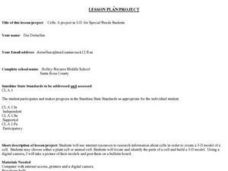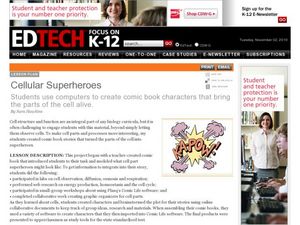Curated OER
Cells: A project in 3-D for Special Needs Students
Students use the internet to research information about cells in order to create a 3-D model of a cell. They may choose either to research a plant or animal cell. Students locate and identify the parts of a cell and build a 3-D mode.
Curated OER
Parts of a Spreadsheet
Learners create their own spreadsheet. They identify the different parts that make up a spreadsheet and organize their data. They practice using functions and formats.
Curated OER
Cell Organelles and Their Functions
Students will be using Inspiration, which is a graphic organizer computer program, to create their own model community where they will label the community parts with the corresponding organelle. They will have prior knowledge of cell...
Biology Corner
Cell Theory Rap
All that this will link you to is a rap about cell theory and organelles. Use it as an example for a creative assignment in your biology class. Divide the class into groups and assign them a topic for which they write and perform a skit,...
Illustrative Mathematics
How Many Cells Are in the Human Body?
Investigating the large numbers of science is the task in a simple but deep activity. Given a one-sentence problem set-up and some basic assumptions, the class sets off on an open-ended investigation that really gives some...
Nuffield Foundation
Observing Water Moving Through Plants
We know plants assist in the water cycle, but how do plants get water from the ground into the air? Through a series of demonstrations or labs, scholars observe the movement of water through plants. They microscopically view the cells...
Curated OER
Cell 7 Plant v Animal Cells
Students differentiate between plant and animal cells. They identify the structures central to plant cells. They complete a Venn Diagram listing the differences between animal and plant cells.
Curated OER
Cell 1 Prokaryotic and Eukaryotic
Young scholars differentiate between prokaryotic and eukaryotic cells. They examine pictures of prokaryotes and eukaryotes and write down the differences between the two. They complete a Venn Diagram on the cells.
American Society for Microbiology
”Build a Bacterium” Scavenger Hunt
An exciting activity has scholars use cell parts to build bacteria through cooperation with other groups. Each group has some of the cell parts needed, but they must trade with other groups to be able to fulfill their function as a...
Curated OER
All The Bell & Whistles
Young adults are so eager to get that first cell phone. And, cell phones have so many cool extras! Learners conduct real-life research to determine which cell phone carrier offers the best deals on things like wall paper, ringtones, and...
Curated OER
Comparing Plans
Good consumer practices such as price comparison can make or break a budget. Youngsters research five different cell phone carriers and the plans they offer. They compile their data and determine which plan offers the best value. They...
Curated OER
Analyzing Advertising
Some ads really make products look great, and even better than they really are! Kids get into small groups to research and compare marketing used by various cell phone companies. They analyze advertisements, carrier options, and cell...
Curated OER
Dream Phone of Basic Phone?
Learning to be a savvy shopper can make or break the bank. Upper graders research five different cell phone carriers to see if they'll have enough money in their imaginary budget for a dream phone or a basic phone. They create either a...
Curated OER
Prokaryotes and Eukaryotes
Examine cyanobacteria cells as an example of prokaryotes and several other alga as examples of eukaryotes. Future biologists compare the two and notice the absence of nuclei in prokaryotes. These are classic activities for this purpose,...
Nuffield Foundation
Investigating Transport Systems in a Flowering Plant
Some weddings have flowers in a unique, unnatural color to match the theme. Young scientists take part in this process to learn about the function of the xylem as they observe colored water moving through a flower. Then, they experiment...
Curated OER
Regents High School Examination: Living Environment 2005
The 2005 version of the Regents High School Examination in the area of ecology is as comprehensive as previous years' exams. It consists of 40 multiple choice questions on everything from the structure of DNA to the interactions within...
Curated OER
Regents High School Examination: Living Environment 2010
This exam touches upon every topic within the typical first year biology course.. A broad variety of question styles give high schoolers every opportunity to show what they know. Why start from scratch when a comprehensive final exam is...
Forest Foundation
The Nature of Trees
Young botanists examine the different parts of tress and then draw parallels between the functions of these parts and the function of parts of the human body.
Curated OER
The Human Genotype
Six different chromosome activites introduce biology aces to heredity, chromosomal abnormalities, sex-linked traits, and the human genome. The hands-on activites are fairly simple for the teacher to prepare and will prove to be both...
Curated OER
Cell Reviews
Students draw cells, make a cell, and list organelles in plant and animal cells. In this cells lesson plan, students create edible cells.
Curated OER
Eukaryotic Animal Cell, Candy Cell Model: Science
Young scholars review the parts of the eukaryotic animal cell and construct a model using various types of candy.
Curated OER
The Human Body: Five Types of Human Cells
Students explore the human body by completing a graphic organizer. In this living cells lesson, students analyze a human body cell's chart and discuss the parts of a cell and what they do for our bodies. Students complete a graphic...
Curated OER
Cellular Superheroes
Ninth graders review cell information by making a comic book. In this cell lesson, 9th graders make the parts of cells into superheroes. They draw these superheroes on the computer and come up with a plot to make a comic book.
Curated OER
Games and Activities to Teach Molecular Genetics
High schoolers demonstrate a working knowledge of cell interactions such as DNA replication, protein synthesis (transcription and translation), through active participation in a cooperative group.
Other popular searches
- Animal Cell Parts
- Parts of Cells
- Eukaryotic Cells Parts
- Animal Cell Parts Pictures
- Animal Cell Parts Draw
- Label Animal Cell Parts
- Eukaryote Cells Parts
- Parts of an Animal Cell
- Cells Parts and Functions
- Parts of Plant Cells
- Plants Cells and Parts























